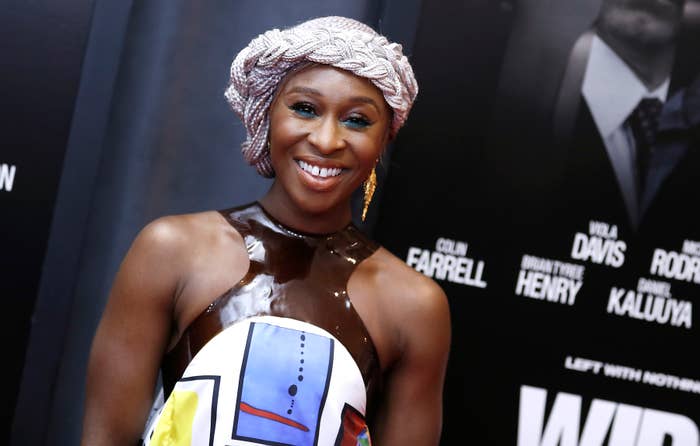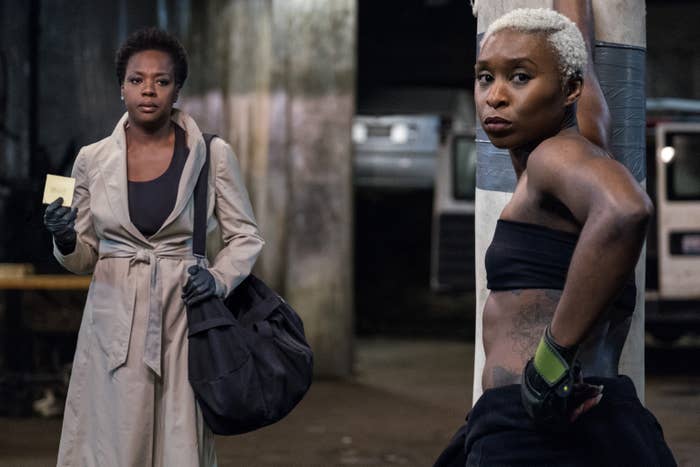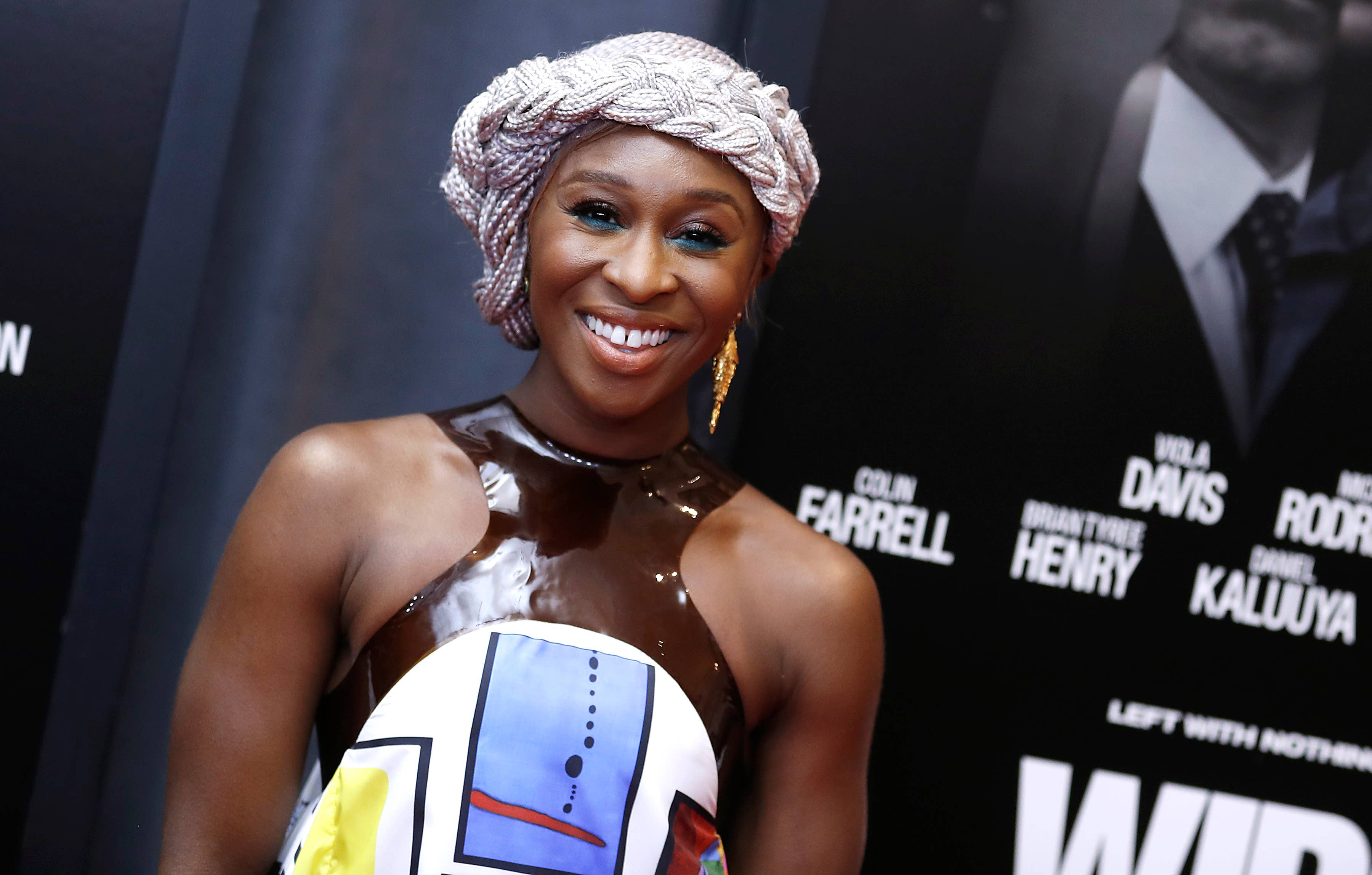
If Cynthia Erivo's performances in two of this fall's most anticipated films—Bad Times at the El Royale and the Academy Award-winning Steve McQueen's Widows, in theaters November 16—have proved anything, it's that the name Cynthia Erivo is going to be on everyone's lips in the very near future. The 31-year-old London-born performer only got her Hollywood film debut in Bad Times back in October, but she brings a host of accolades and awards with her.
Think about it: there have only been 15 individuals who carry the title of "EGOT"—aka winning an Emmy, Grammy, Oscar, and Tony. Those individuals include Whoopi Goldberg, John Legend, and Rita Moreno. Erivo's just missing the "O." Her work as Celie (the character that Goldberg made famous) in the 2015 Broadway revival of The Color Purple netted Erivo her Emmy, Grammy, and Tony award wins, and one has to wonder if an Oscar is on the way for her upcoming portrayal of Harriet Tubman in the Kasi Lemmons-directed biopic Harriet. Like we said, you're going to be hearing a lot from Cynthia Erivo, very soon.
When we caught up with Cynthia during a round of press surrounding Widows in Chicago—in between shooting Harriet, actually—she was cool, calm, and collected. Her years on the stage have prepared her for this moment, her moment, and you get the sense that Erivo was easing into whatever this new chapter on her journey will turn into.
You’ve been around for a while, but you’re definitely a fresh face, especially for American audiences. It feels like you’re working towards something really special right now, especially in terms of the two projects you're featured in this fall. Is that overwhelming for you?
I think I’m just riding it out because if I start thinking about what it might be, what might happen, I think I might overwhelm myself. So, I’m just going with it. I’m enjoying it right now. I’m just trying to make sure that I do the right work, and just whatever comes from it comes from it. I’m really, really excited about what’s happening in this moment. I have to sort of have to remind myself to enjoy each moment as it happens because everything is new. So it’s kind of cool.
You’ve been on the stage for a while. When did you first get into acting? What was it about acting that really attracted you?
I think, the first time I had the inkling or the feeling of maybe wanting to do acting was at 11. It was at an after-school stage program type thing, and I just liked the idea of being able to assume someone else’s life and tell their story. And the idea of being able to use myself in order to tell a story was really—I don’t know why, it was so much fun to me. It just felt like there was a rush from being able to tell these people’s stories. People that I might not be able to meet anytime soon. I don’t know, it allowed my imagination to run wild.
Were you always singing as well?
Yes. My mom thinks I was singing when I was like two. I can’t remember that far back. My first time remembering singing was when I was about five. I ended up singing “Silent Night” in a Nativity play. I don’t know why they wanted me to [sing] “Silent Night.” I was a shepherd, so there wasn’t really a reason for them to want me to sing (laughs). But they did, and I really enjoyed it. I realized that it made people happy, and I think that—you know, when you’re five, it’s just very cut and dry, simple. They’re happy, which makes me happy, so I’m gonna keep doing that to make people happy. You know when kids make people laugh, they keep doing the same thing because it makes people laugh. That’s essentially what happened when it came to singing.
Was your role in Bad Times at the El Royale contingent on your singing? Were they aware of you as a vocalist going into this and that’s why they chose you?
I think they knew I was a vocalist, but the thing that I needed to have when it came to doing any vocal performances was that I had to sing live. The only thing you hear in Bad Times was me singing live on set. There was no pre-record, nothing. I think they knew I had done The Color Purple, but they haven’t seen me do The Color Purple. So it was really like my tape was the thing that most of them were watching for the first time when it comes to me in action. I definitely think that singing live was the thing that was make-or-break for that role.
In that film, you worked with Jeff Bridges, and in Widows, you share the screen with Viola Davis. How important is it to work with actors of their stature this early in your film career?
They’re the kind of people that give lessons without really knowing they’re doing it. Jeff is—you have to watch Jeff when he’s in his element. One, he’s this wonderful, kind, sweet person, and then when he’s getting ready to do a scene, there’s something really charismatic and so sure and knows exactly what to do. He asks all the right questions. I definitely used that kind of guidance, even when it came to technical things because I was still learning.

When it came to doing Widows—because that was the very first thing I had ever done—with Viola there’s this wonderful stillness that she has. I knew how to pick lines up quickly, real quickly. You would give her a whole new paragraph and she would just learn it there and then. And it would be full and informed and truthful. [And I'd be] flabbergasted, because she had five minutes to do it. I don’t know if anyone can do what she does. But it’s really wonderful to be in the room as she’s processing and working through something because it really is a master class as to how to do that and to have something be informative, as well as entertaining. She’s brilliant.
How difficult is going from acting live on stage to being in an actual film, on a film set? Is there a big learning curve between the two?
I think it is quite big, for me, just because I’ve spent so long on stage. I’m used to having the audience there, and they’re immediate. They kind of tell you what they need. And I’m also used to if I have to talk to someone, I look directly at them. I don’t really cheat. You know, there’s times when you need to cheat for the scene because you need to see your face a little bit more. On stage, I’m one of those people that’s happy to have my back to the audience if a person is behind me and I have to talk to them, and it won’t change much because I can still inform with my back. You can’t really do that if the camera is needing to see your face. So that’s sort of hard. You have your audience, and they tell you what’s going on, but on-screen you don’t have that.
You kind of have to rely on your gut instincts and your director and the rest of the cast. Then you have no idea of what they’re gonna pick and what’s gonna be right, so you have to let everything go and wait until you see it. That’s a new thing, because really you get to make those decisions when you’re on stage and when you’re live, yourself.
What was it like working with Steve [McQueen] on Widows?
There’s something really wonderful about that man. He has this way of finding the thing that you don’t think you have and getting it out of you. He sees more in you than you think you see in yourself. And that’s the really wonderful thing about working with him. On top of that, he’s thoroughly joyful about working on film. He loves it. It’s the idea of creating art, the idea of telling people’s stories, the idea of letting people into a life that they otherwise wouldn’t be able to see. He’s still nervous and excited about the process of making something. And that’s really wonderful to be around because it’s infectious. If he feels excited, then I’m probably going to feel excited, and then I don’t feel silly for feeling really excited. And I was, because it was my first time. But if he still feels that way, then I know that I’m not overreacting. He’s just been really, really encouraging, and I’m really glad that he was the person I got to do my first film with.
In Widows, you play Belle. You come in at a pivotal moment of the film, in terms of what the team needs. Talk about the process of getting into Belle’s head. Were there any people in your life that you modeled your performance after, in regards to her?
I don’t actually think that there were any people that I modeled her after. I think I took bits and pieces from other people. Like I took a little bit from my sister, my sister talks no-nonsense, she talks very straight down and very forward about what she’s thinking. There are things that excite her, but it takes a lot to excite her. It takes a lot to throw her off her game. I sort of put some of my physical aspects into her. I’m the person that runs around and I’m always working out, and I tried to amplify that. And the hair and the nails, those [are] from some girls that I have met and they’re a part of me as well, because I always had my hair long and my nails done. I wanted to infuse her with all of the different women I had met in my lifetime because I feel like they’re the women that tell the right story.
She was definitely the most active. I’ve been a guy who’s missed a bus and had to run after a bus, so I definitely felt for her breaking into a full stride in the street to catch that bus. But also the sneaking and hopping around. It sounds like that was no problem for you at all.
No, no problem at all. I love that stuff. In the future, and now, and if I have any films that require me to be that physical, I’m sort of welcoming the idea of me doing it myself. I really enjoy doing it there, and I think if I can keep doing it then it’s kind of cool. You don’t get the opportunity to do that enough, and I welcome those.
What are your thoughts on seeing yourself in the finished process?
At first it was weird. It was really weird. I had to get used to seeing my face look that huge on a screen. It looked really weird. And then, you sort of let that go and remember that you’re playing a character, and I was proud of what we had. I was really proud of what it looked like. Also, it’s weird to see your body when you don’t see it yourself. Because you can see one thing, but when it’s staring back at you in action, you’re like—I really, genuinely was like “oh, I’m working out well!” or “so that’s what everyone talks about when they talk about my arms. I really like that!”
I don’t know if a lot of people have talked about it, but this something that strikes out to me. You hit the stage and have now done two different roles that Whoopi Goldberg shined in [Ed Note: Erivo has also played Sister Mary Clarence in the Sister Act musical]. Have you had a chance to meet her?
I have.
Has she seen what you’ve done?
I think she saw both, I think. And the one I met her at The Color Purple. And then I did The View. I had to come up to The View, and I had spoken to her afterward. We had dinner or something at her house. And she’s so cool. She’s unbelievably cool. And she was really, really encouraging. And I remember she said some really wonderful words; I didn’t know that she would say that, so it felt really, really sweet.
You’ve got these two films dropping this year, but you’re also playing Harriet Tubman in the Harriet film.
I’m literally in Virginia shooting it right now.
Was getting that role a difficult process?
I’ve been in the project probably for about two years now. They saw me in The Color Purple. We had a meeting, I read the script, we sat, we talked about it—it’s been a process for sure. I think they wanted to be sure I was ready for it, I wanted to be sure I was ready for it, so it took a while before I was like “yeah, I definitely want to do this project.” It took maybe a few different drafts before I was like “this is a script that I can definitely do.” I love the script that we have right now. Kasi Lemmons wrote it and is directing it. She just wrote something that was really beautiful, and I felt like it tells a really beautiful story of who this woman was and it took us a while before I was like I have the physical capability and the mental capability to tell the story fully.
When you talk about the time frame and trying to get yourself mentally prepped, what was it that you were trying to get past?
One, I wanted to finish these things, because I was still in The Color Purple, so my head was still in that show, and I was still playing Celie, so that was a beast in itself. I needed to be away from her for a little bit. I needed to be refreshed because I was so drained by the end of that performance, I didn’t know if I had very much left. Then these other roles came up, and I just wanted to be in the right mindframe to see what it is that we were going to do. I knew that the role would be heavy. I knew that it would be physically heavy, I knew that it would be emotionally heavy. I knew that everything that I had needed to be poured into it. And I wanted to know that I was ready to be on film. If it was my first one, I would’ve been like “no I can’t.” I don’t think I could’ve done it if it was the very first thing I get myself into, because I needed to see the landscape of film first before I did something like this. Now having done four films, I feel like I’ve finally given myself the time and space to be ready to tell this story.
In the past, we've seen Daniel Kaluuya get flack for playing an American black guy while being British. What are your thoughts on those types of arguments in regards to Harriet?
I do think there is a conversation to be had because I think it has more to do with feeling like there isn’t enough visibility. I think people feel invisible. There aren’t many of these roles that come along. There’s a lot of us that want to be in these films, there are people who watch and feel like there are people being passed over to give a role to someone like me. All I can say is that I know that I’m not jumping into a role that has been passed to me I easily. It’s not something they haven’t thought about. I’ve made sure that it isn’t a choice that I’m making to just take a role without thinking about the implications and what I have to do. Maybe now’s the time to have the conversation about people feel and how the feeling of feeling invisible is not gone. And we need more of these stories told, we just need more of them. Because if more of these stories are told, then no one would worry about that.
You hit nail right on the head with that one. Shifting gears, do you ever think about joining the shortlist of EGOTs?
People have mentioned it, and it makes me laugh because I don’t how to approach it. I didn’t really expect to be three-quarters of the way there by this point. I don’t know if I knew that it would happen. So when it did happen, I was like “oh, OK." I feel like if I just approach it the way I approach everything else, without expectations, if it happens, then it happens.
Do you have any aspirations to work behind the camera?
Yes. Sometimes I’m asked if I have any idols or any people that I look up to, and Barbra Streisand is one of those people, simply for the fact that she’s been able to do everything. I feel like she’s one of the original renaissance woman. She’s been behind the camera, she’s been a director of something, and she’s been a producer of something, and she sings and makes her albums, and she makes her films. I wanted to be able to do that. Also, I have a passion for wanting to tell the stories of woman that never get told. I can’t help but want to create things, wanting to make things that haven’t been made. I guess that’s where it’s kind of leading, I think that’s the direction we’re gonna end up being in.

